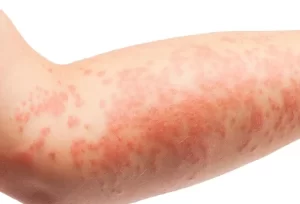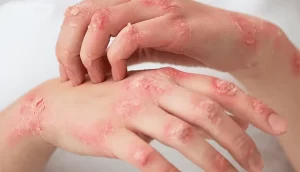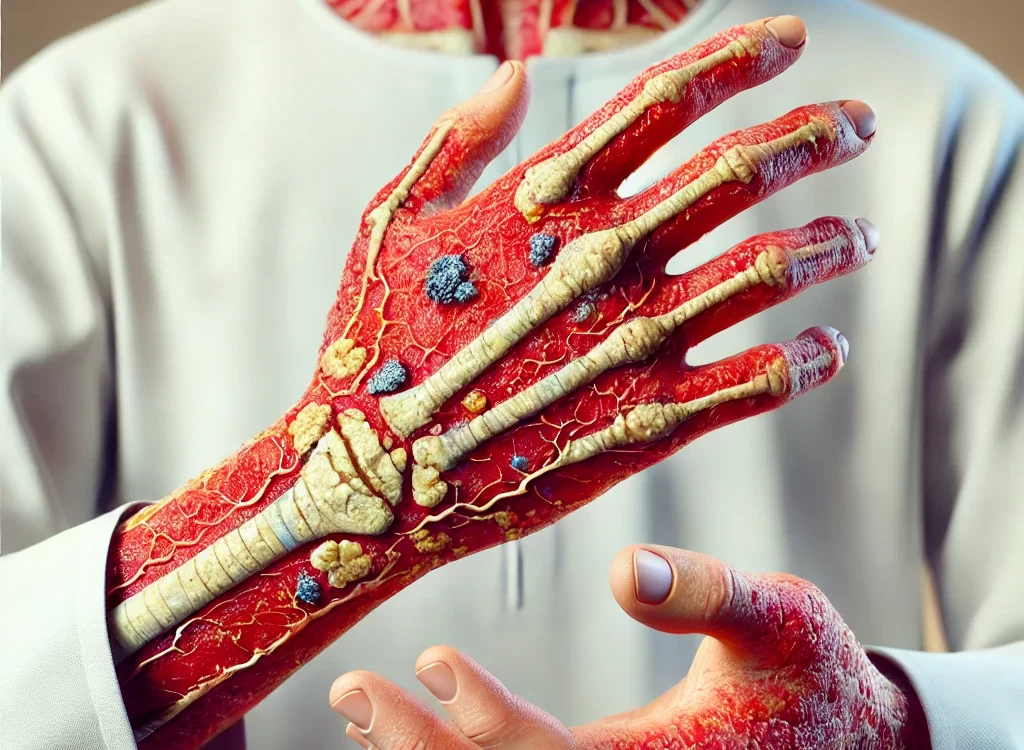About atopic eczema
Atopic eczema, also known as atopic dermatitis, is a common type of eczema that causes itchy, inflamed, and cracked skin. It predominantly affects children, but many adults also experience symptoms throughout their lives. Although the condition can improve over time, particularly in children, atopic eczema is often chronic and tends to occur in cycles of flare-ups and periods of lesser symptoms.
Symptoms and Affected Areas
Commonly, atopic eczema affects areas such as:
- The backs or fronts of the knees
- The inner or outer sides of the elbows
- Around the neck
- The hands
- The cheeks and scalp (more common in infants and children)
Flare-ups result in dry, red, cracked, and itchy patches on the skin. Individuals with atopic eczema often experience cycles where symptoms become more severe and then subside.

Causes
While the exact cause of atopic eczema is unknown, it often occurs in people prone to allergies. “Atopic” refers to an increased sensitivity to allergens. Key contributing factors include:
- Genetic predisposition (runs in families)
- Association with other atopic conditions like asthma and hay fever
- Triggers such as soaps, detergents, stress, environmental factors, and changes in weather
- Food allergies, especially in young children with severe eczema
Treatment
Although there is no cure for atopic eczema, treatment aims to relieve symptoms and prevent flare-ups. Options include:
- Self-care: Minimizing scratching, avoiding triggers, and keeping the skin well-moisturized.
- Emollients (Moisturizers): Applied regularly to keep skin hydrated and reduce dryness.
- Topical Corticosteroids: Used to alleviate inflammation, redness, and itching during flare-ups.
For milder cases, pharmacists can provide advice and over-the-counter treatments. More severe cases may require consultation with a GP or a dermatologist for specialized care.
When to Seek Medical Advice
Individuals experiencing severe or persistent eczema symptoms that interfere with their quality of life should seek professional guidance. While most cases of atopic eczema can be managed with proper care and treatment, complications such as skin infections may develop and need prompt attention.
Who is Affected?
- About 1 in 5 children in the UK is affected by atopic eczema, with 8 out of 10 cases developing before the age of 5. Many cases improve significantly or resolve during childhood or adolescence.
- However, the condition can persist into adulthood or, in some instances, first develop in adults.
Proper care, a personalized treatment plan, and avoiding known triggers can help manage symptoms and improve the quality of life for individuals with atopic eczema.
Symptoms of Atopic Eczema
Atopic eczema is characterized by the following symptoms, which may vary in severity from person to person and can affect different parts of the body:
1. General Symptoms
- Itchy Skin: Itching is often severe and can be persistent. Scratching can worsen the condition, leading to further irritation, skin damage, and even infections.
- Dry and Cracked Skin: Affected areas often become extremely dry, rough, and can crack, leading to discomfort.
- Red, Inflamed Skin: The skin can turn red, appear inflamed, and feel warm to the touch.
- Soreness and Pain: Inflamed areas can become sore and painful, especially if scratched frequently.
- Thickened or Leathery Skin (Lichenification): Long-term scratching can cause the skin to thicken, giving it a leathery appearance.
- Rash Locations: Eczema can appear anywhere, but it is most common in the following areas:
- Children: Face, scalp, insides of the elbows, and backs of the knees.
- Adults: Hands (particularly the fingers), insides of the elbows, knees, neck, and face.

2. Severity of Symptoms
- Mild Eczema: May involve small areas of dry, occasionally itchy skin. The impact on daily life is generally minimal, though still uncomfortable.
- Moderate Eczema: Causes more noticeable patches of red, dry, inflamed skin, leading to more frequent itching and discomfort.
- Severe Eczema: This can involve widespread areas of red, inflamed skin all over the body, severe and constant itching, cracked skin, and frequent flare-ups.

3. Periods of Remission and Flare-ups
- Flare-ups: Symptoms may worsen periodically due to various triggers such as stress, environmental factors, or contact with irritants.
- Remission: There are times when symptoms may lessen or almost disappear, only to return with flare-ups.
4. Commonly Affected Areas
- Hands and Fingers: Atopic eczema often affects the hands, causing dryness, redness, and cracking.
- Elbows and Knees: Commonly seen on the insides of elbows or backs of knees where skin folds can trap sweat and irritants.
- Face and Scalp: Particularly common in children but can also occur in adults. In adults, it often involves the cheeks and around the eyes.
- Neck: The neck area can also become inflamed, especially when sweating or wearing restrictive clothing.
5. Impact on Daily Life
- Sleep Disruption: Severe itching, especially at night, can disturb sleep, leading to fatigue and difficulty concentrating during the day.
- Social and Psychological Impact: Visible rashes can lead to embarrassment, low self-esteem, anxiety, or depression. The psychological impact of eczema should not be underestimated, especially in children and young adults.
6. Skin Changes Over Time
- Temporary Pigment Changes: After inflammation improves, affected areas of skin may temporarily appear darker or lighter. This change is more noticeable in people with darker skin tones.
- No Permanent Scarring: Unlike scars, these pigment changes are not permanent and eventually fade as inflammation resolves.
7. Complications of Atopic Eczema
- Infections: The damaged skin barrier can lead to bacterial or viral infections. Signs of infection include:
- Eczema worsening rapidly
- Fluid oozing from the affected skin
- Development of a yellow crust or small yellowish-white spots
- Swelling and increased pain or soreness
- Fever or feeling unwell
- Cycle of Itching and Scratching: Constant scratching can lead to a cycle where the skin becomes even more inflamed and itchy, causing sleepless nights and difficulty focusing on daily tasks.
Managing Atopic Eczema Symptoms
- Moisturizing: Regular use of emollients (moisturizers) to maintain skin hydration.
- Topical Corticosteroids: These are used during flare-ups to reduce swelling, redness, and itching.
- Avoiding Triggers: Identifying and avoiding factors like soaps, detergents, certain foods, stress, and temperature changes that can trigger flare-ups.
- Reducing Scratching: Keep nails short, wear gloves at night if needed, and use anti-itch creams or medications.
When to Seek Medical Help
- If eczema significantly worsens, or if there are signs of infection like yellow crusting, fluid discharge, increased swelling, or a fever, consult a healthcare professional promptly. Professional treatment may involve stronger topical treatments, oral medications, or antibiotics if infections are present.
Atopic eczema can greatly impact a person’s quality of life, but with proper management, many individuals can achieve symptom relief and reduce the frequency and severity of flare-ups.
Causes of Atopic Eczema
Atopic eczema is a complex condition with no single identifiable cause. Instead, it is believed to develop due to a combination of genetic, immune, and environmental factors. Here’s an overview of the potential causes and common triggers:
1. Genetic Factors
- Inherited Risk: People with atopic eczema often have a family history of the condition or related conditions such as asthma or hay fever (known as atopic conditions). Children are more likely to develop eczema if one or both parents have eczema or other atopic conditions.
- Filaggrin Gene Mutation: Research has identified a link between eczema and mutations in the filaggrin gene, which is responsible for forming a protective barrier on the skin. This mutation can lead to a weakened skin barrier, making the skin less able to retain moisture and more prone to irritants and allergens.
2. Immune System Response
- Overactive Immune System: Eczema is associated with an overactive immune response to environmental triggers. This results in inflammation that causes the skin to become red, itchy, and sore.
3. Skin Barrier Dysfunction
- Dry and Sensitive Skin: People with atopic eczema have a compromised skin barrier that loses moisture easily and does not provide adequate protection from irritants, allergens, and environmental factors. This leads to dry, sensitive skin that is more prone to inflammation.
4. Environmental Triggers and Irritants
- Soaps and Detergents: Common household products such as soap, shampoo, bubble bath, and washing-up liquids can strip the skin of natural oils and exacerbate dryness.
- Cold, Dry, or Humid Weather: Extreme weather conditions, either cold and dry or hot and humid, can cause flare-ups.
- House Dust Mites and Pet Fur: Exposure to dust mites, pet dander, and fur can trigger symptoms in some people.
- Pollen and Moulds: Allergies to pollen, moulds, or other environmental allergens can worsen eczema symptoms.
- Certain Fabrics: Wool, synthetic fabrics, or rough materials worn next to the skin can cause irritation.
- Food Allergies: Common food triggers include cow’s milk, eggs, peanuts, soya, wheat, fish, and shellfish, particularly in young children with severe eczema.
- Dry or Dusty Air: Environments with dry or dusty air can make symptoms worse.
- Heat and Sweat: High temperatures and sweating can trigger itching and worsen symptoms.
5. Hormonal Changes
- Menstrual Cycle: Many women experience a worsening of eczema symptoms just before their menstrual period due to hormonal fluctuations.
- Pregnancy: Hormonal changes during pregnancy can cause eczema to flare up in some women, while others may see an improvement.
6. Stress and Emotional Factors
- Stress: Stress does not directly cause eczema, but it can make symptoms worse. Stress-induced scratching or changes in behavior due to stress can lead to flare-ups.
7. Skin Infections
- Infections: Skin infections caused by bacteria, fungi, or viruses can exacerbate eczema symptoms. A common infection linked with eczema is caused by the Staphylococcus aureus bacteria, which can worsen itching and inflammation.
8. Triggers Vary from Person to Person
- The specific triggers for atopic eczema can differ greatly among individuals. Identifying and managing personal triggers is a key part of treatment and symptom control.
Identifying Triggers and Managing Symptoms
- Work with a Healthcare Provider: If you are diagnosed with atopic eczema, your GP or pharmacist can help you identify potential triggers and develop a management plan.
- Avoiding Irritants: Use mild, fragrance-free cleansers and moisturizers, and avoid known irritants.
- Environmental Management: Consider allergy-proofing your home, especially if house dust mites, pet fur, or other environmental factors trigger your symptoms.
- Allergy Testing: In some cases, allergy testing may help identify specific food or environmental allergens contributing to symptoms.
By understanding the potential causes and triggers of atopic eczema, people with the condition can take steps to manage their symptoms and reduce the frequency and severity of flare-ups.
Diagnosing Atopic Eczema
Diagnosing atopic eczema (atopic dermatitis) is typically straightforward, with your GP relying on an examination of your skin and a discussion about your symptoms and medical history.
Key Steps in Diagnosis:
Physical Examination
- Your GP or healthcare professional will examine areas of your skin to identify signs of eczema, such as redness, dryness, and inflammation.
- They will look for common signs of atopic eczema, including:
- Irritated, red skin in areas like the insides of elbows, backs of knees, neck, hands, cheeks, or scalp.
- Dryness and flaking skin.
Questions About Symptoms
- Your doctor may ask:
- Is the rash itchy, and does it worsen at certain times (e.g., at night)?
- Where on the body do symptoms typically occur?
- When did symptoms first appear, and are they chronic or intermittent?
- Do any family members have a history of atopic eczema, asthma, or allergies?
- Are there any other associated conditions, such as hay fever or food allergies?
- Sharing details about the impact of eczema on your daily life, like issues with sleeping or difficulty with activities due to itching, can help the GP assess the severity of the condition.
- Your doctor may ask:
Diagnostic Criteria for Atopic Eczema
To be diagnosed with atopic eczema, a person typically needs to have had an itchy skin condition within the last 12 months and at least three of the following:
- Visible Signs: Inflamed skin in characteristic areas, such as creases of the elbows or knees, cheeks, or outer parts of arms/legs (especially in younger children).
- History of Symptoms: Recurrence of skin irritation in these areas.
- Chronic Dry Skin: Persistent dry skin over the last 12 months.
- Family History: A personal or family history of related conditions like asthma or hay fever. For children under four, this can also apply to immediate relatives with these conditions.
- Early Onset: Symptoms beginning before the age of two years (except for children under four during diagnosis).
Establishing Triggers
Identifying triggers that worsen atopic eczema can help in managing symptoms effectively:
Lifestyle and Diet Assessment
- You may be asked about your daily habits, including exposure to potential irritants like certain soaps, detergents, or environmental factors.
- Keeping a food diary may be recommended to identify food-related triggers. This involves recording everything you eat and noting any eczema flare-ups.
Potential Triggers to Discuss
- Irritants like specific soaps, shampoos, detergents, and household products.
- Allergens, such as dust mites, pollen, pet dander, and certain foods (e.g., dairy, peanuts, eggs).
- Environmental factors like weather changes, stress, and sweating.
Allergy Testing
- In most cases, allergy testing is not necessary for diagnosing atopic eczema, but it may be recommended if food allergies are suspected, especially in young children.
Additional Considerations
- Referral: In severe or complex cases, your GP may refer you to a dermatologist for further assessment and management.
- Treatment Options: Your healthcare provider will guide you on treatments, which may include emollients, topical corticosteroids, and lifestyle changes to minimize triggers.
This comprehensive approach ensures that potential causes and triggers of atopic eczema are identified, allowing for effective symptom management and improved quality of life.
Treating Atopic Eczema
Atopic eczema, also known as atopic dermatitis, is a long-term condition with no cure. However, various treatments are available to manage symptoms, ease discomfort, and prevent flare-ups. Treatment plans can include self-care practices, medications, and in some cases, specialized therapies under a dermatologist’s care.
Main Treatments for Atopic Eczema:
- Emollients (Moisturisers): Used daily to keep the skin hydrated and reduce dryness.
- Topical Corticosteroids: Creams or ointments applied to reduce swelling, redness, and itching during flare-ups.
Additional treatments may involve:
- Topical pimecrolimus or tacrolimus for sensitive areas not responding to simpler treatments.
- Antihistamines to control severe itching.
- Bandages or special body wraps to promote healing.
- More powerful therapies prescribed by a dermatologist.
Self-Care and Lifestyle Tips:
- Reducing Scratching: Scratching exacerbates eczema, thickens the skin, and increases infection risk. Gently rubbing the skin instead of scratching and using anti-scratch mittens for babies can help. Keep nails short and clean and wear light clothing to reduce skin damage.
- Avoiding Triggers: Identifying and avoiding triggers is crucial. Potential triggers include:
- Certain fabrics (e.g., wool or synthetic materials).
- Heat or dry air.
- Soaps, detergents, and other harsh chemicals.
- Dietary Changes: Some foods, such as eggs and cow’s milk, may trigger eczema. Consultation with a GP, pharmacist, or dietitian is recommended before making dietary changes to ensure proper nutrition, especially for children.
Emollients:
Emollients keep the skin hydrated, reduce water loss, and can help reduce flare-ups. Different types are available, including:
- Ointments: High oil content, effective for very dry skin but can feel greasy.
- Creams and Lotions: Lower oil content, less greasy, but may be less effective. You may need to try different emollients or combinations to find the best fit for your skin type.
Application Tips:
- Use emollients even when symptoms are not present.
- Apply large amounts and smooth gently in the direction of hair growth.
- Pat skin dry after bathing and apply emollient immediately.
- Use spoons or pumps for emollients in jars to avoid contamination.
Topical Corticosteroids:
When eczema flares up, corticosteroids can reduce inflammation and control symptoms. These vary in strength:
- Mild (e.g., Hydrocortisone)
- Moderate (e.g., Clobetasone Butyrate)
- Strong (e.g., Mometasone) Frequent use should be monitored by a GP.
Application Tips:
- Apply emollients first and wait about 30 minutes, or use corticosteroids at a different time.
- Apply only the recommended amount as per your prescription.
Potential Side Effects:
- Mild stinging upon application.
- Thinning of the skin (rare with appropriate use).
- Skin color changes (rare).
- Acne or increased hair growth (rare).
Other Treatments:
- Antihistamines: Help relieve severe itching, especially sedating antihistamines for nighttime use.
- Bandages and Wet Wraps: Used over affected areas to prevent scratching and retain moisture.
- Corticosteroid Tablets: Used for short periods during severe flare-ups.
- Specialist Care: Dermatologists may provide specialized treatments, including:
- Topical Calcineurin Inhibitors: Immunosuppressant creams/ointments.
- Phototherapy: UV light to reduce inflammation.
- Immunosuppressant Tablets: For severe cases.
- Alitretinoin: For severe hand eczema in adults.
Seeking Professional Advice:
- Visit your pharmacist or GP for eczema management and to identify potential triggers.
- If symptoms are severe, interfering with daily activities, or not responding to treatment, you may be referred to a dermatologist.
By adopting a comprehensive treatment plan and maintaining self-care routines, you can effectively manage the symptoms of atopic eczema and improve your quality of life.
Complications of atopic eczema
Atopic eczema, while primarily known for causing itchy, inflamed skin, can lead to additional complications that affect both physical and mental well-being. It’s important to understand these potential issues and seek proper treatment and support to manage them effectively.
1. Bacterial Skin Infections
The broken and cracked skin associated with eczema can increase the risk of bacterial infections, particularly when scratching worsens the condition or treatments are not used properly.
Signs of Bacterial Infections Include:
- Fluid oozing from affected areas
- Yellow crust on the skin
- Small yellowish-white spots
- Swelling, soreness, and increased redness
- Fever and general unwellness
If you suspect an infection, consult your doctor promptly. They may prescribe antibiotics in the form of tablets, capsules, or creams to treat the infection, alongside measures to manage the underlying skin inflammation. It is advisable to replace any used creams and ointments after the infection clears to prevent reinfection.
2. Viral Skin Infections
Eczema may also be complicated by viral infections, such as infection with the herpes simplex virus (typically responsible for cold sores), leading to a condition known as eczema herpeticum.
Symptoms of Eczema Herpeticum Include:
- Rapid worsening of painful eczema
- Fluid-filled blisters that burst, leaving shallow sores
- Fever and feeling unwell
Immediate medical attention is needed if eczema herpeticum is suspected. Treatment usually involves the antiviral medication aciclovir.
3. Psychological Effects
Atopic eczema can also take a toll on mental health, impacting behavior, self-confidence, and overall emotional well-being.
Behavioral and Psychological Challenges Include:
- Preschool Children: May exhibit hyperactivity, behavioral issues, or increased dependence on parents.
- Bullying: Schoolchildren may face teasing or bullying due to their eczema. This can lead to social withdrawal, anxiety, and low self-esteem. Parents and teachers should be informed so they can provide support and encouragement.
- Sleep Problems: Itching and discomfort from eczema can disrupt sleep, leading to fatigue, mood swings, difficulty concentrating, and problems at school or work. Informing teachers about your child’s condition may help accommodate any learning disruptions.
- Self-Confidence: Eczema can negatively impact body image and self-esteem, particularly in children, who may struggle with social skills or feel self-conscious about their appearance. Encouragement, support, and specialist psychological help, if necessary, can improve self-confidence.
Managing Complications
- Avoid Scratching: Keeping nails short, wearing protective clothing, and using anti-scratch mittens for children can help minimize skin damage.
- Treat Skin Infections Promptly: Seek medical advice if you notice any signs of infection.
- Support Psychological Health: Provide emotional support, connect with support groups like those offered by the National Eczema Society, and discuss concerns with healthcare providers.
- Improve Sleep Quality: Follow a consistent bedtime routine, use moisturizers before bed, and create a comfortable sleeping environment.
By being proactive about potential complications and maintaining good self-care, people with atopic eczema can better manage their condition and improve their quality of life.







